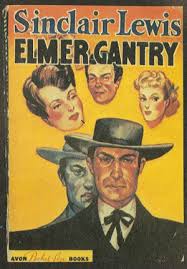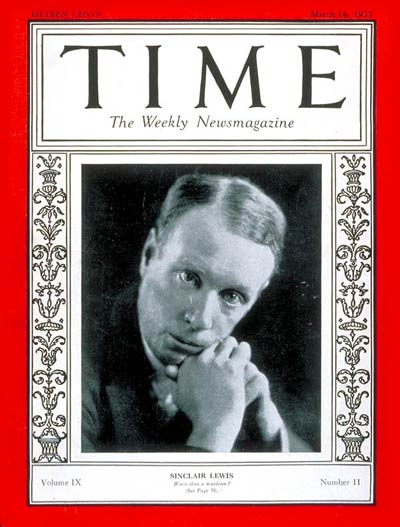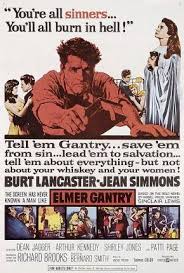In this novel Lewis recounts the life and adventures of the title character with the sledgehammer subtlety that marks all of his work that I have read: ‘Arrowsmith’ and ‘Babbitt.’ In a generous mood, I will call it satire rather than sophomoric caricature.

Elmer Gantry is a self-centred charlatan who starts out a travelling salesman selling anything and everything from snake oil to farm machinery to anyone with a dollar. He has a gift of the gab and personal charm that makes him a success, but he also has many faults that undermine that success, chiefly the faults of whiskey and women.
He learns to sell religion and salvation, and not only does that make money, but it also gives him a power that is so satisfying that, to some extent, he controls his faults. Indeed, he stops drinking altogether. Gantry enjoys the competitive element in drawing crowds and raising money against other rival churches and barnstorming evangelists. Most of all, he enjoys manipulating others, for which he seems to have a gift, i.e., people believe what he says, even those who should know better.
He uses and abuses believers, fellow preachers, and several women.
There are a few bon mots and a couple of well-turned phrases, but for three hundred pages the prose is, well, prosaic.
The telling is episodic and relentless in demonstrating Elmer’s one-dimensional unscrupulousness and complete amorality. There is no limit to Gantry’s mendacity, duplicity, and deceit. There is never a qualm of conscience. Never does he do something for another but always for Elmer over the forty year period covered in the book. He never seems to grow or to change. He switched addiction from booze to power, discovering he could still have women on the side. It becomes one note repeated again and again.
The only people who see through him are either bookish ineffectuals or the blackmailers, who are themselves so corrupt that they have to back off.
The underlying theme is that religious people are all fools in one way or another. Like those without religion, Sinclair cannot imagine what faith means to others.
There is one dramatic moment when Reverend Pengilly asks Elmer why he does not believe in God at the end of Chapter 27 and it not resolved and so becomes a non sequitur.
By far the most interesting character and the best part of the book concerns the strange evangelist Sharon Falconer. She is far more compelling than Gantry himself. She also seems to be sincere in her mission, though she likes the money, too. Doing well by doing good, as Ben Franklin did say. She seems to be a split personality. Lewis kills her off. That is approximately the middle third of the book.
 Sinclair Lewis on the cover of Time Magazine.
Sinclair Lewis on the cover of Time Magazine.
I retain a very strong recollection of the film ‘Elmer Gantry’ (1960), but had never read the book. In memory the film concentrates on Falconer. Time to do the homework. While travelling in Turkey, I downloaded it to the Kindle and read it.
 A lobby poster for the film.
A lobby poster for the film.
When I started reading the description of Elmer at the beginning brought to mind the very actor who embodied him in the film, Burt Lancaster. It seemed as though, Lewis created Elmer cased on Burt, though that is chronologically impossible.
Skip to content
